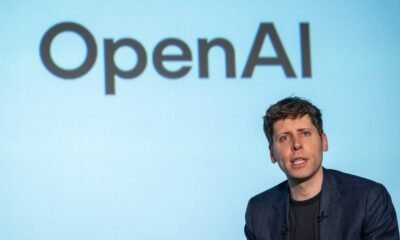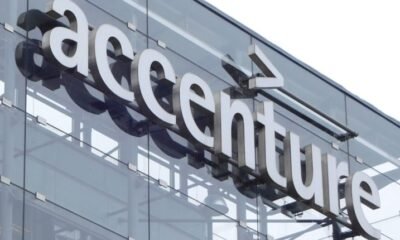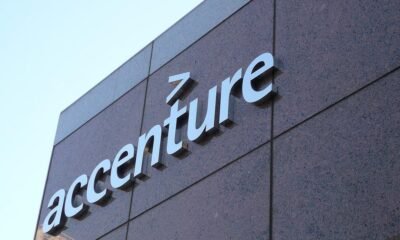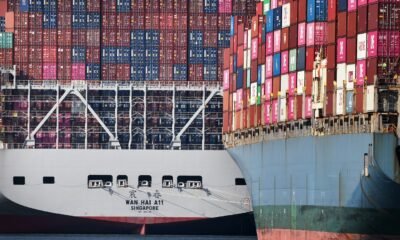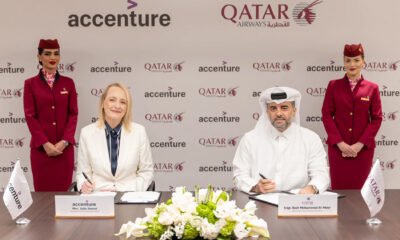Business
AI was supposed to kill consulting. Instead, Julie Sweet has positioned Accenture to cash in
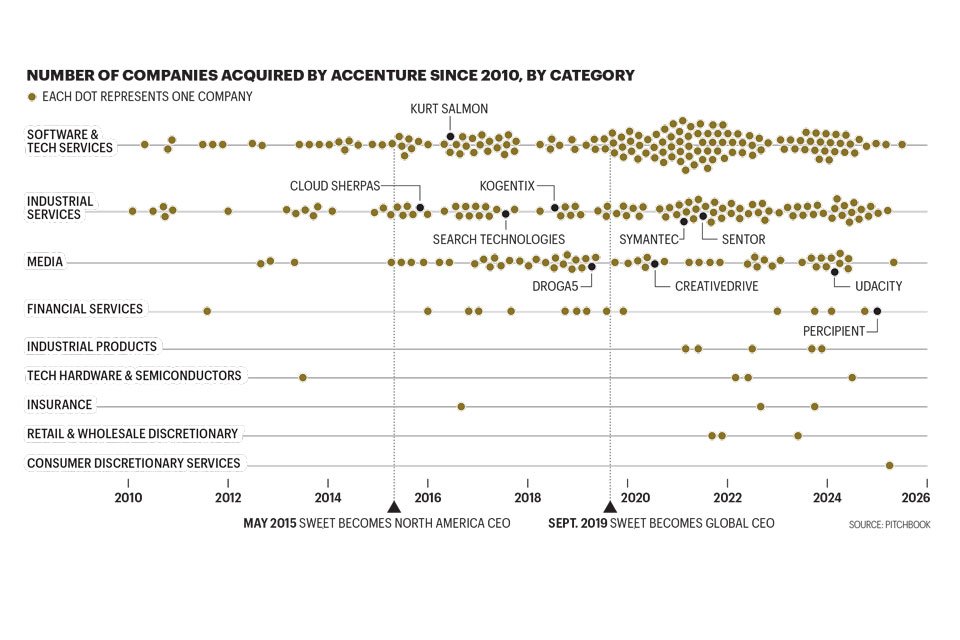
In the early hours of Russia’s invasion of Ukraine, on Feb. 24, 2022, world leaders published statements denouncing Vladimir Putin’s aggression, and historic monuments around the world were lit up in blue and yellow, the colors of Ukraine’s flag. As the death toll began to climb, executives of companies with operations in Russia began debating whether it was ethical to stay engaged with the country at all.
Accenture, the consulting and tech services company, had a $120 million business and 2,300 employees in Russia at the time. At its Washington, D.C., offices, chief executive Julie Sweet huddled with her top brass.
“We got off the phone after one of those calls, and Julie said, ‘We’re getting out of Russia,’” Accenture general counsel Joel Unruch recalled. “With less than 24 hours of thinking. The next day, we announced it.”
Accenture’s announcement on March 3 was just one week after the invasion had started— and by April 1, Accenture was out. Sweet spun off the company’s Russia operation and gave it to some of the firm’s in-country employees, incurring a $96 million loss.
“Sometimes the right thing to do is not clear,” Sweet says now. “But Russia was super clear.” She explained: “This was not one of those things where we wanted to wait and see, ‘What will others do?’”
Sweet’s rapid-fire response was both remarkable and typical of the CEO, who came to Accenture from a successful career in law. Those who have worked with Sweet say she regularly makes bold leaps following a specific recipe: She rigorously studies the topic in question (war, the cloud, agentic AI), seeks insights from a wide range of people, and then makes breathtakingly swift decisions. This formula has made Accenture, a $176 billion company, an unlikely trailblazer.
“Julie is one of the top leaders in the corporate world, period,” Citigroup chief executive Jane Fraser told Fortune. “I mean, there aren’t many other people who can come close.”
Since the start of Sweet’s tenure, Accenture’s market capitalization has almost doubled, from $90 billion in 2018, the year before Sweet was named global CEO. That year, Accenture recorded annual revenue of $41 billion. Last year, it was $65 billion.
Some of that growth can be attributed to Sweet’s aggressive acquisitions strategy, which has given the company expertise in cutting-edge data, analytics, and AI technology. Accenture has gone from making a few acquisitions annually before Sweet became general counsel to about 40 per year. Last year alone, Accenture closed on 46 mergers, spending $6.6 billion.
Chart by Fortune
Accenture has also grown organically, however, thanks to Sweet’s demonstrated ability to see trends and get ahead of them. The company had about 774,000 employees globally at the end of 2024, compared with 460,000 six years ago. Sweet now leads a staff that’s larger than the population of Washington, D.C., and approaching that of San Francisco— and the nature of Accenture’s consulting work means that her leadership also impacts the millions of employees at its customers’ companies. Among the many household names that are Accenture’s clients there are banks like Citi, Barclays, J.P. Morgan, and Spain’s BBVA, as well as food brands Mars and Nestlé, oil major Saudi Aramco, and pharmaceutical giant Pfizer.
Unlike strategy-focused consulting firms like BCG or McKinsey, which study a client’s business and present suggestions for change, Accenture also takes on operations and services on behalf of its clients, deploying Accenture employees to provide SAP integration, for example, or cybersecurity. (“We’re not delivering just PowerPoints,” Sweet once explained.) Accenture also has rivals in the IT consulting space, but they don’t have the traditional C-suite consulting chops or the same breadth of clients. Accenture is the only consulting company that offers it all at scale.
This has made it the 800-pound gorilla in the consulting sector, with nearly 20 times the number of employees as McKinsey (with 40,000 employees)—which itself is slightly larger than Booz Allen (34,000) and BCG (33,000). Accenture also greatly exceeds rivals in the accounting and IT services sector like Deloitte (460,000), Capgemini (340,000), and Cognizant (360,000).
And some analysts say Accenture is well-placed—in fact, best-placed among the big consultants—to leverage its AI investment. It has already booked $1.8 billion in AI revenue this fiscal year and has delivered more than 2,000 generative AI projects. In one lucrative project, the Australian telecom Telstra committed to spending $700 million over seven years to enter an AI-focused joint venture agreement with Accenture.
But Sweet also faces hurdles. For one, many companies have begun pulling back their spending amid uncertainty over trade policies, global conflicts, and fears of a recession. And Accenture Federal Services, which designs and implements tech for U.S. federal agencies and accounted for 8% of the firm’s global revenue last year, has taken a hit in recent months, with some of its contracts landing on the DOGE chopping block.
And then there’s a bigger, existential question: Could generative AI be a double-edged sword, a sales opportunity for the company today that becomes the technology that replaces it tomorrow? As The Economist asked in a recent pointed headline: “Who needs Accenture in the age of AI?”
Sweet said she’s not worried about the consulting industry being replaced by AI. “AI is only a technology,” she said. “The value comes from reinvention of how we work, our workforces and the tools we use…We are making sure that we are leading the way with our own reinvention.”
The CEO is also facing a personal trial. In February, she disclosed that she had been diagnosed with breast cancer, saying that she would continue running Accenture during her planned 12 to 16 weeks of radiation treatment. “The good news is the prognosis from my doctor is excellent; the cancer was caught early, and my condition is curable,” she wrote in a memo to staff. (It was her second bout with the disease. Sweet was also treated for breast cancer in 2014.) The only adjustment Sweet made as she endured the side effects of radiation was to temporarily restrict her travel.
Sweet’s friends who spoke to Fortune say that they worried about the CEO pushing herself too hard, but they were not surprised by her stoic resolve. Part of knowing Sweet is to understand that, as Fraser put it, “she is a woman on a mission.”
Coaching 900 clients through a chaotic moment
In early April, President Donald Trump stood on the lawn of the White House holding unwieldy poster-size tables listing the shockingly high import tariffs he said he planned to roll out to 90 countries. He called the event “Liberation Day,” but the immediate result was economic chaos: The extreme levies sent the corporate world reeling, causing a short-term stock market free fall and raising questions about supply chain strategies and inflation, as well as the risk of a global financial crisis or an all-out implosion of America’s consumer-based economy.
During that tumultuous week, Sweet moved quickly to connect with Accenture’s clients, speaking with more than 900 over a few days in web seminars. “Other than COVID, we really haven’t seen a moment like this in the last six years,” she said. “This is a moment where every corner of the globe is being affected, and companies have very little control.”
In late April, a five-minute walk from where Trump announced his tariff plan, Sweet described her response to that crisis in her large corner office. With its floor-to-ceiling windows, imposing white desk, and sheer curtains that allow light to flood the space, it’s strikingly serene. Sitting on an L-shaped pale blue sofa, the fair-haired 57-year-old executive sipped cucumber water and discussed the “macro environment”—without mentioning the president by name—between morning meetings.
It’s easy to imagine Sweet exuding that same calm in those seminars following Liberation Day. Her counterintuitive advice—then and now, as the business world faces ongoing uncertainty—was not to take cover but rather to start taking chances. Making bold decisions now will mean more than during normal times, she told clients, because other business leaders will likely wait to see how the flap over tariffs plays out. While they freeze, you should leapfrog, she argued.
Easier said than done, perhaps. But this leapfrogging approach is a competitive strategy that Sweet has implemented at her own company. In 2017, when Sweet was CEO of Accenture North America, she saw that cloud technology was the future of data storage. At the time, most IT consultants, including Accenture, were still busy helping companies build on-site data repositories. Sweet began moving all of Accenture’s business into the cloud, making Accenture the go-to cloud consultant for hundreds of the world’s largest companies that soon discovered they needed to do the same, particularly during the pandemic. Cloud services now make up close to 50% of Accenture’s revenues.
“This is a moment where every corner of the globe is being affected, and companies have very little control.”Julie Sweet, CEO of Accenture
And in early 2022, before the debut of ChatGPT made the world aware of generative AI’s capabilities, Sweet was talking to CEOs about AI’s rise. By that time, Accenture had already trained thousands of employees on the technology. Some clients suggested to Sweet that her thesis about how AI would fundamentally alter the way companies work was “consulting talk,” Sweet recalled. “AI was not a top priority in 2022 for most CEOs.” But she had conviction. And in 2023, Accenture announced it would spend $3 billion on artificial intelligence, not only to make its own operations more efficient, but also to make the company an authority on AI for its clients.
In Sweet’s sunlit, uncluttered office, the more she spoke about trade, markets, or any topic, the more it became obvious that Sweet’s unruffled demeanor was tied to something deep: the crisp clarity with which she sees the world and pathways forward within it. This is the friend you call when you’re spiraling, I remember thinking. For CEOs dealing with wars, ongoing tariff uncertainty, government cutbacks, and immigration crackdowns, while also wrapping their hands around the promises and perils of AI, Sweet is that person.
“She’s very clear-eyed; she’s always curious,” Citi’s Fraser said of Sweet. “I think this is probably what will give her incredible longevity as a leader.”
Before their first meeting, just after Fraser was named CEO of Citigroup, in 2020, Fraser remembers asking herself how an ex-lawyer came to be running Accenture, she told me. But within the first 20 minutes of her Zoom call with Sweet, the Accenture CEO was coaching Fraser, offering tips on optimizing remote work, and suggesting she establish an operating rhythm, advising Fraser to carve out one morning per week, preferably Monday, for time to think and plan. Fraser took the advice.
A lesson for a 15-year-old that stuck with her for life
In the small universe of high-powered CEOs, Sweet is part of a tiny club. Accenture, which is headquartered in Ireland, is ranked No. 211 on the Fortune Global 500 list for 2025 and is one of only 5% of Fortune Global 500 companies run by women.
Sweet rarely refers to her gender in interviews, but in her home library she has a framed New Yorker cartoon that acknowledges her uncommon accomplishment. It features a young girl interrupting her father as he reads a bedtime story. “Skip to the part where the princess climbs to the top of the corporate ladder,” the caption reads. Sweet received the cartoon as a gift when she became CEO, and now she sends it to all the women she meets who earn the same title. “It just makes me smile,” she said.
When she was growing up in Tustin, Calif., the corporate ladder was not something Sweet, née Spellman, envisioned climbing. Her father, an Army veteran, was a master car painter, and her mother didn’t get her college degree until Sweet was an undergrad.
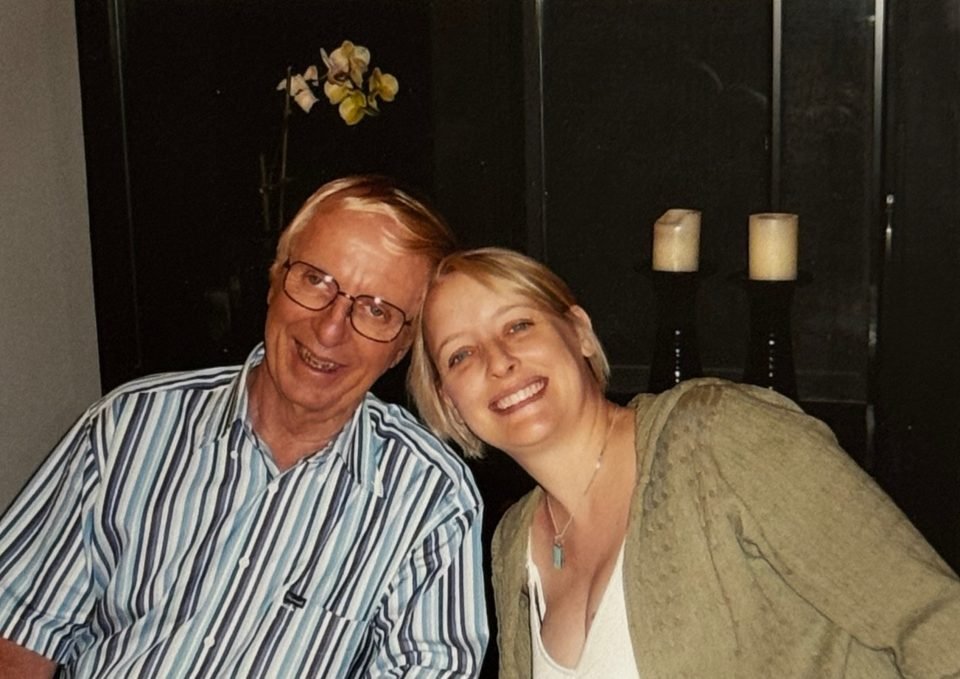
Courtesy of Julie Sweet
Sweet, who has two siblings, says that her childhood was happy, but the family’s budget was tight, and money was always an issue. When she was 14, Sweet landed a job as a reservations clerk at a local dinner theater to help pay for the things she wanted, like a second pair of shoes.
She had walked into the theater alone with her résumé in hand. “They’d never hired a teenager, like, ever,” Sweet said, but the owner gave her the position—taking reservations, answering phones, and greeting guests—on the spot. “At the time, I don’t think I understood how much I was learning to adapt, to change, to grow very, very fast in my skills and my ability to navigate.”
Sweet was a strong student, and by eighth grade she already knew she wanted to be a lawyer—partly influenced by the 1980s television show L.A. Law, a drama that leaned heavily into cheesy romantic storylines but was also one of the earliest programs featuring whip-smart career women in power suits regularly outsmarting their male colleagues. “It was all these cool, beautiful people,” Sweet recalled.
In high school, Sweet would often enter debate tournaments and speech contests in the hope of winning cash prizes. At a Lions Club tournament, “you could earn, like, $500,” she recalls, so her father would drive her to the events in his beat-up VW bug, wearing the only sports coat he owned.
One evening, she made it to the semifinals but lost. The top prize went to the daughter of the club’s president. On the way home, she recalled, “I was kind of complaining in the car to my dad, ‘Oh, she was so cutesy, and she was the daughter of the president.’”
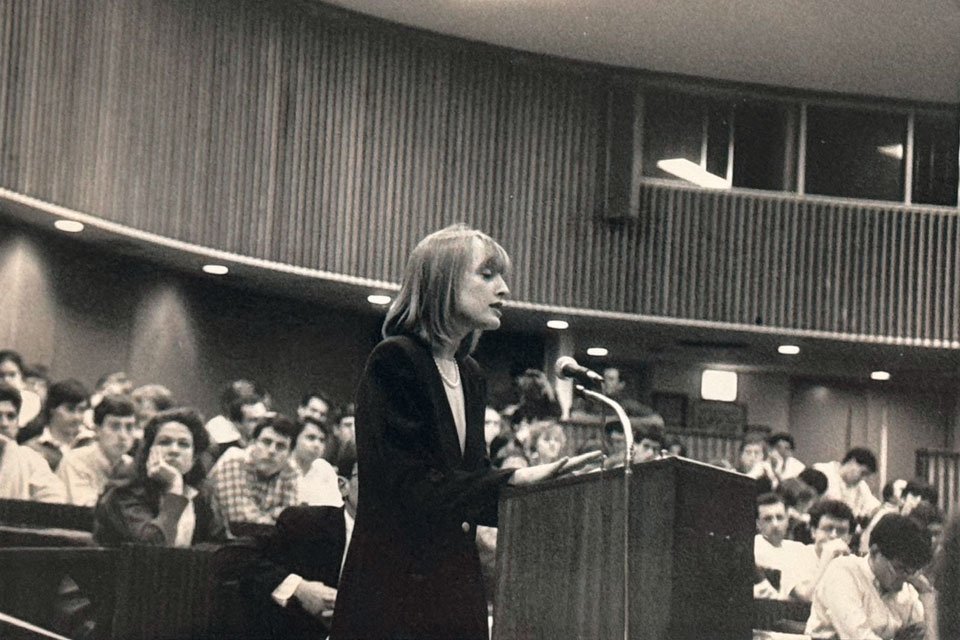
Courtesy of Julie Sweet
“My father looks at me, and he says, ‘First of all, Julie, you’re never going to be the daughter of the president of the Lions Club. That’s not the family you were born into,’” she recounted. “‘And I believe you can do anything, but…you have to be so much better than anyone else that they have to give it to you.
“‘Tonight,’” he continued, “‘you weren’t that much better.’”
It was her first experience of constructive feedback, Sweet said—one that also taught her to be honest with herself about her performance. “That was the message from my dad: You should be fearless, but you have to be ready,” she said.
Not putting in the work was a mistake she would not make again.
A distinguished law career, disrupted
Sweet won a scholarship to Claremont McKenna College in California, and went on to study law at Columbia University, from where she was hired at Cravath Swaine & Moore, one of the oldest and most elite law firms in Manhattan, in 1992. Within eight years, she was named partner—the ninth woman in the firm’s then 170-year history. And in 2007, Sweet landed on the cover of The American Lawyer as “Dealmaker of the Year” for leading private equity titan KKR’s $5 billion public offering of one of its funds.
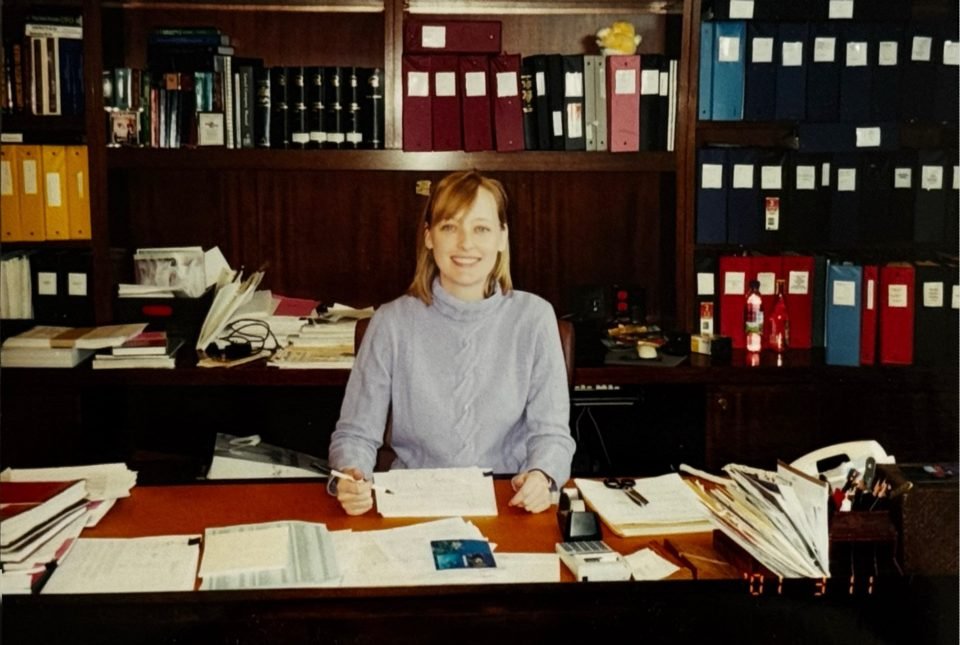
Courtesy of Julia Sweet
People don’t quit Cravath. But Accenture came calling in 2010, to recruit Sweet as general counsel. Her father had recently passed away at age 68, which Sweet believes played a role in her striking out on a new path. “I was very reflective at the time because he died so young,” she said in an email. “And it reminded me to make sure I was living life to the fullest—and my dad had done so.”
Ellyn Shook, a former longtime CHRO of Accenture, was part of the group that recruited Sweet. “She was a businesswoman,” Shook said of her. “She did big-time corporate transactions, and we were at a point in our history where we had always been a company that grew organically.”
Sweet often points out that when she arrived at Accenture, she didn’t know much about tech at all. She had no idea what the cloud was. So she assigned herself a tutor, Bhaskar Ghosh, who is now Accenture’s chief strategy and innovation officer, but previously led its India tech centers. Sweet met with Ghosh virtually every two weeks for 18 months. “She’s from a legal background, but I can tell you, at any day, Julie understands technology better than a lot of technology leaders,” Ghosh explained to me. “She goes on asking questions until she understands the fundamentals.”
Sweet sees a lesson in this approach for other leaders, especially in the age of AI. “They have to know technology is no longer just plumbing,” she said. “They have to know how their products are going to change; they have to understand it.”
Sweet made the leap to global CEO following tragic circumstances. In January 2019, Accenture’s then-CEO, Pierre Nanterme, a widely admired leader and Accenture lifer who had begun to prioritize technology adoption at the company, abruptly stepped down. He had been undergoing treatment for colon cancer, and he died later that month, at age 59. Six months later, Sweet was named global CEO, a post she took up in September of that year amid a period of strong growth at the company.
She showed her decisiveness right away. Sweet felt the company had outgrown its structure—one that organized its services by industry—so she remade Accenture’s divisions, overhauling the firm’s P&L entirely in six months, and pivoting to a model that divided the businesses by geography. “The most important thing to be successful is that your people are close to the client, so they understand what they need,” Sweet said. On the last day of that process, she moved 200 out of 300 leaders into new roles.
To put it mildly, it was a lot of disruption, but Sweet says it was necessary in a time of tech acceleration. And part of Sweet’s philosophy is that Accenture needs to show its clients that change can happen, at scale, quickly. “When I’m talking to another CEO and advising them about the change they need to drive, I do so having also done it myself,” she said. “I’m not just telling them what they have to do.”
In 2019, Sweet demonstrated her knack for seeing around corners once again when Accenture purchased Droga5, founded by advertising guru David Droga and one of the most awarded advertising agencies in the world. Droga5 was behind the bouncing QR code that led millions of sports fans to visit the website for the crypto exchange Coinbase during the Super Bowl in 2022. In 2008, the agency produced “The Great Schlep,” a campaign urging young Jewish Americans to schlep to Florida to urge their conservative grandparents to vote for presidential candidate Barack Obama.
Accenture had bought smaller creative firms before, but adding Droga and his eponymous agency to Accenture’s empire, for a reported $475 million, gave the company new weight in all things customer-facing, including creative work and marketing technology. It also added an intangible asset and what Sweet calls a “core competency”—creativity—to Accenture’s senior leadership team. Droga5 was rolled into a line of business that was renamed Accenture Song, which became the world’s largest digital advertising agency. “She identified that the media agency industry was looking more and more like the consultancy business, and that was an addressable market that they could go after,” Harry Read, a U.K.- based analyst for Rothschild & Co. Redburn, told Fortune. (Accenture did not provide comment on industry reports of high-level M&A talks between Accenture and WPP, another advertising giant.)
Because of these diverse businesses, Accenture can claim credit for an unusually wide range of products it had a hand in creating. Working with Mars, its robotics and AI team helped the candymaker ensure that every package of Skittles came with the same number of candies inside. Partnering with L’Oréal, Accenture designed AI to give customers precise product-finding tools. Last year, Accenture even won a Sports Emmy Award for Accenture Song’s promotional spot for Battle of the Baddest, a crossover boxing and UFC fighting match that aired on ESPN.
The rise of a brand new industry: consulting
Accenture hasn’t always been such a multifaceted company. It began life in the 1950s as the consulting arm of the now-defunct accounting firm Arthur Andersen.
Founded in 1913, Arthur Andersen launched strategy consulting services to augment its core business in the middle of the century, when a postwar boom saw U.S. companies hungry for advice on workforce management, operations optimization, and innovation.
During this mid-century period, management consulting firms, including Arthur Andersen, McKinsey, and Booz Allen, all founded before World War I, gained greater prominence. They were later joined by companies like BCG, in 1963, and Bain, in 1973.
But the real growth spurt for consulting arrived in the 1980s. With the knowledge sector dominating complex world economies and consultants expanding globally, the biggest accounting firms saw an opportunity and jumped into the fray. They added consulting businesses and competed to win the loyalty of corporate clients with their own management theories and two-by-two matrices. By 2000, the consulting industry was estimated to be worth $250 billion—and it has grown massively since then.
As consultants became a more common feature of big business and governments, they were also more often ensnared in, if not the cause of, unethical corporate behavior. Even the scandal-free often attracted derision, with a reputation for creating efficiencies by restructuring companies, offshoring or automating jobs, triggering mass layoffs, and walking away with millions in client fees.
Arthur Andersen Consulting rebranded as Accenture in 2001, two years after it became an independent company. The move was well-timed to avoid association with an infamous case of consulting misconduct: Arthur Andersen’s auditing business was prosecuted for destroying documents relevant to the Enron investigation. (Its conviction was later overturned by the Supreme Court.) Accenture, a play on “accent on the future,” went public in 2001.
Now, six years after remaking Accenture’s P&L model, Sweet is changing Accenture again. At the end of its latest earnings call, she announced that Accenture will restructure its operations, beginning in September, combining its five functions—strategy, operations, technology, Accenture Song, and consulting—into one unit, Reinvention Services, to be headed by Manish Sharma, the company’s current CEO of the Americas. The specifics of the internal reorganization are still being hammered out, but what’s clear is that some walls between advertising and marketing, software development, and strategy advisory will come down.
“I think this is a positive change for Accenture, because these days, those large enterprises, when they come to Accenture to seek a digital transformation solution, they are seeking integrated or end-to-end solutions,” said Luke Yang, an analyst at Morningstar. “This is something that only Accenture can do.”
Sharma recently echoed that sentiment, telling Fortune that the move will “turbocharge” Accenture. “We are the only company in the world that can deliver some of the big reinventions for our clients,” he said.
Asked whether the restructuring will involve layoffs, Sweet said: “I’m sure we’re going to find duplication and efficiencies, because you always do when you have separate business units and you bring them together.” She said, however: “This isn’t a cost play. This is about, ‘What do our clients need?’”
“Clients need us to bring the solutions that we’re bringing to our biggest clients faster, and they need them at all levels. Smaller clients need the same complex solutions,” she explained.
During its fiscal third-quarter earnings call, Accenture reported earnings per share of $3.49, beating the Street’s estimate of $3.32. The company saw $17.7 billion in revenue, topping the expected $17.3 billion. Despite the positive numbers, shares fell 6% that day on the news that Accenture had seen a slowdown in bookings.
But at Mizuho Securities, analyst Sean Kennedy is sanguine about Accenture’s future, as the private and public sectors adapt to AI. “What she’s doing is positioning Accenture for that next wave of growth that she’s seeing,” Kennedy said. Recently, he noted, Sweet was instrumental in securing two multimillion-dollar partnerships: one with Nvidia to train tens of thousands of Accenture employees on its technology, and another with Palantir, the software company cofounded by Peter Thiel, to introduce AI-driven software across federal agencies.
Clients suggest that Sweet has won these partnerships because CEOs instinctively trust her and appreciate her attentive dedication to their problems. “In every conversation I had with Julie, she was completely in that conversation,” Vicki Brady, CEO of Telstra, told me. “She was passionate, curious, well-briefed. You felt like you could be her only client.”
Sweet’s training as a lawyer taught her to ingest large amounts of information at once, she has said. And that training made her a strong communicator. “In the world where she works, on the technology and implementation side,” Brady said. “I think people can sometimes make it more complicated than it needs to be, whereas she does entirely the opposite.”
Both clients and executives with experience reporting directly to Sweet laud the CEO’s intelligence but also her doggedness. Several describe her drive as “relentless” and say her understanding of other people’s jobs is sometimes alarmingly comprehensive. “I always think, if I come to Julie, and there’s one thing that I’m not 100% sure about,” Joel Unruch, general counsel, said, “Julie’s going to find it.”
As a part of the hiring process, Accenture’s leaders take a Gallup personality test that identifies a person’s inherent positive traits from among dozens of possibilities, including “empathy” and “go-getter.” For Sweet, Shook recalled, “competition” surfaced as a top-five strength, but Shook says Sweet’s competitiveness was directed externally; internally, she pushed her top leaders to perform at their best. “When you have a business ambition to be the market leader in a very crowded field, you have to have drive and ambition every day,” Shook said. “I’ll tell you, working for a CEO that wants to win is a big high.”
Political pressures and pivots
Accenture and Sweet have also weathered some misfires and criticism. Four years ago, the company talked about the metaverse the way it discusses AI now—as a game-changing platform that would overhaul work and change companies. Accenture purchased 60,000 Oculus headsets from Meta for employees to use on its “Nth Floor,” a virtual world where employees could be onboarded and join training seminars, or where ERGs could set up exhibitions or throw events. But the Nth Floor was later all but abandoned. The company backtracked from the metaverse once it became obvious that the tech wasn’t about to be widely adopted.
Accenture has faced political pressures, too. Some activists have called attention to the consulting giant’s work with defense contractors Raytheon and Lockheed Martin, whose weaponry is used in conflicts around the world, including in Gaza. Others are alarmed by its partnership with Palantir, whose analytics software is being used for, among other things, speeding up Donald Trump’s migrant deportation agenda. Accenture did not provide a comment on either criticism.
This year, in response to the Trump administration’s orders about DEI at federal contractors, Accenture dropped its gender diversity hiring and promotion goals. The company also ended career training programs aimed at specific groups. Sweet wrote in a memo that the changes came following an “evaluation of our internal policies and practices and the evolving landscape in the United States.” But Sweet says diversity is still part of the business strategy, and that the company remains focused on inclusion.
One way Accenture has attracted employees from underrepresented groups is through its apprenticeship program, aimed at those who do not have a four-year degree, Sweet told me. The CEO launched the program in 2016 to solve a few problems: Accenture needed committed, entry-level employees with specific sought-after skills, in areas like cybersecurity or manufacturing, and many communities across the U.S. needed well-paid jobs for people who didn’t go to college. Apprentices are paid during the months of their training, and most graduates land a job at Accenture, making a reported average of nearly $60,000 per year. Accenture has hired about 2,500 employees through the apprenticeship system, which feeds 20% of its entry-level hires, according to Sweet.
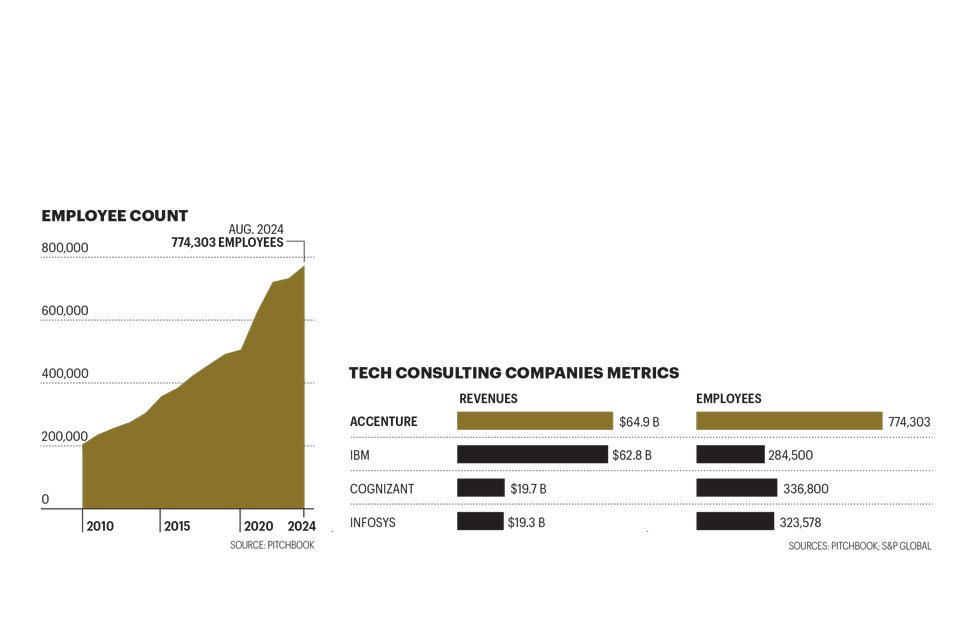
Chart by Fortune
Joshua Hawkins, an apprentice studying at Accenture’s new tech hub in Ward 8, a low-income district of Washington, D.C., met Sweet this spring when she visited the University of Washington D.C. building hosting the program. “I always can tell if someone is genuine within five seconds of looking at them,” Hawkins, a former massage therapist, told me, “and her story and everything was genuine.”
That afternoon, Sweet was surrounded by a gaggle of government officials, Accenture executives, the heads of organizations that partnered with Accenture on the initiative, and a police officer escorting the VIPs. But Sweet’s attention was clearly locked on the apprentices. She listened, beaming, as the students, many young parents who lived in the neighborhood, described what the opportunity meant for them. One woman said she skipped ahead in the curriculum at night to prepare for the class, explaining, “I don’t ever want to be behind. I want to be ahead.”
Sweet has also personally joined efforts to help people who are struggling, and she has a particular interest in improving one aspect of their lives: sleep. She regularly donates high-end bedding and beds to FurnishHopeDC, a local non-profit that serves families in low-income districts. For some people living in cramped quarters, Sweet explained in an email to Fortune, “the only place they can call their own is their bed. And having a good quality bed allows them to sleep better, which is so important for health and being able to have a positive mindset.”
Sweet called sleep “critical for adults and kids to be able to be successful,” but added, “when you see the joy in the face of a child when they get a beautiful bed—well, you cannot stop doing it.”
During the pandemic, she also became involved in resettling refugees in the D.C. area.. That was how she met Mohammad Hotak, a refugee from Afghanistan who landed in Silver Spring, Maryland, in 2021. Hotak previously worked for the U.S. Embassy and the United Nations in Kabul and was among thousands of Afghans who fled when the Taliban took back power that year in the wake of the U.S. military’s departure.
The day he first spoke to Sweet, Hotak was living in an empty apartment with his wife and four children. They had some food, and little else—“nothing but walls and silence,” he said. Hotak recalls answering a video call from a blonde woman he had never met before shortly after arriving in the U.S. She said she wanted to know how she could help him. He only later learned that the woman was Sweet, the chief executive of a huge company.
Sweet asked Hotak to give her a video tour of his apartment. “I panned the phone to look all around. Of course, I was embarrassed and unsure. But she didn’t hesitate, she didn’t make any big promises,” he recalled. Sweet asked a few questions about the kids and their preferences. “She just said, ‘Let me see what I can do,’ and we cut the call.”
A few days later, Sweet arrived at Hotak’s door clutching a bag of silverware and other kitchen goods. She had an entourage of half a dozen volunteers, many members of an Accenture veterans employee group, all carrying bedding, towels, and pieces of furniture. Sweet brought food that was appropriate for a Muslim family, Hotak said, and duvets in the kids’ favorite colors. “I’ll never forget the way she carefully arranged everything,” he said.
Hotak later became a government relations specialist at Accenture, after Sweet suggested he reach out to the HR department. “I’ve been to some of the town halls where she spoke,” he says. “She treats everybody with dignity and respect,” Hotak said. “That’s how Julie is.”
A moment of vulnerability
Sweet’s human, relatable side also came through when she sent a letter sharing her cancer diagnosis with her hundreds of thousands of employees. She drew press coverage and praise for her openness, but Sweet says she never considered not being transparent about her condition. “Had I tried to hide it, it would actually have been counter to who I am,” she told Fortune. She also saw the situation as an opportunity to promote the importance of regular cancer screenings, she explained, especially because so many of her employees live in countries where screenings are not as common as they are in the U.S.
Sweet discovered her first cancer in 2014, through a mammogram, and the more recent cancer because of a self-exam. “I’m such a great example of the importance of doing self-exams because we caught it early,” she said.
But Sweet’s cancer, however treatable, has also been a reality check, a reminder that it’s easy to be wrong about what’s around the corner—even if that has been her talent. On a call in June, between festivities for her daughter’s high school graduation, Sweet stepped back to consider the moments that have defined her year.
“I was thinking about New Year’s Eve. Boy, was I wrong about 2025,” she mused. “It just grounds you. Like, life: You are not in control.”
Correction: An earlier version of this story misspelled the first name of Vicki Brady, CEO of Telstra.
This article appears in the August/September 2025 issue of Fortune.
Business
Tories would maximise North Sea oil and gas extraction, Badenoch to say | Kemi Badenoch
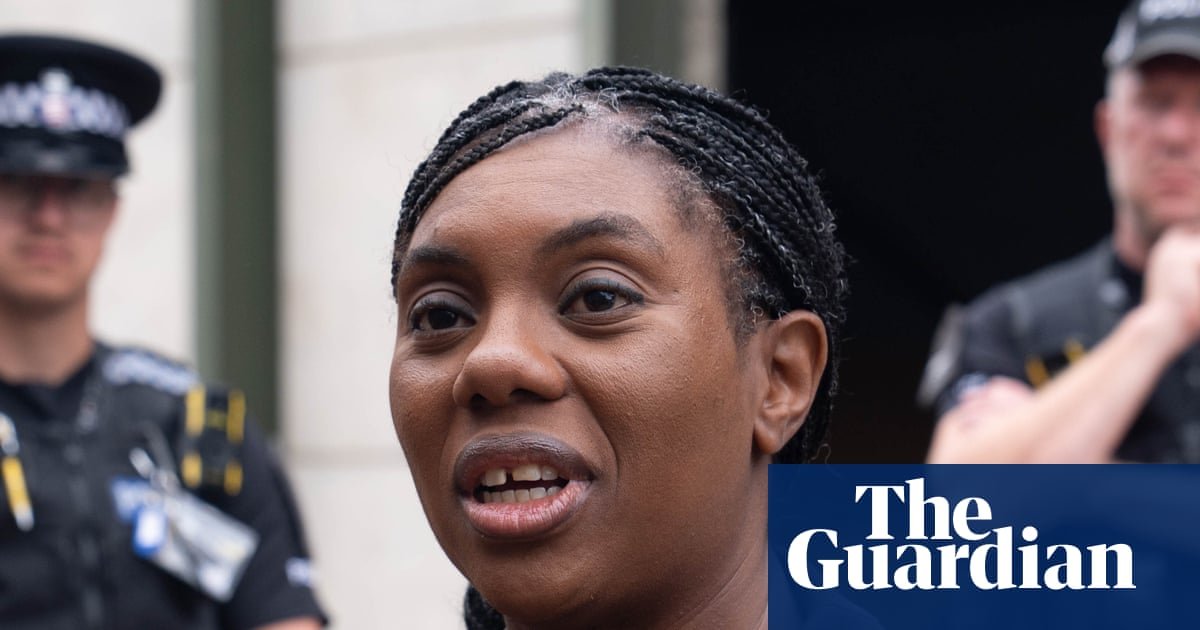
The Conservative party will aim to “maximise extraction” of oil and gas in the North Sea if it wins power, Kemi Badenoch is expected to announce.
Badenoch will use a speech in Aberdeen in the coming days to set out her plans to extract as much oil and gas as possible instead of shifting away from fossil fuels, the Sunday Telegraph reported.
She will announce the Tories plan to overhaul the North Sea Transition Authority, which oversees the issuing of licences, dropping the word transition and replacing its 12-page mandate with a simple order to extract the maximum possible amount of fossil fuel.
Badenoch said Britain “cannot afford not to be doing everything to get hydrocarbons out the ground” to boost growth.
She said: “We are in the absurd situation where our country is leaving vital resources untapped while neighbours such as Norway extract them from the same seabed.
“Britain has already decarbonised more than every other major economy since 1990, yet we face some of the highest energy prices in the developed world.
“This is not sustainable and it cannot continue. That is why I am calling time on this unilateral act of economic disarmament and Labour’s impossible ideology of net zero by 2050.
“So, a future Conservative government will scrap all mandates for the North Sea beyond maximising extraction.
“It is time that common sense, economic growth and our national interest came first, and only the Conservatives will deliver that. We are going to get all our oil and gas out of the North Sea.”
Last month, the energy and net zero secretary, Ed Miliband, accused the Conservatives of being “anti-science” by abandoning a political consensus on net zero.
after newsletter promotion
In the first of what is promised to be an annual “state of the climate” report, the Labour MP set out the findings of a Met Office-led study that detailed how the UK was already hotter and wetter, and faced a greater number of extreme weather events.
Miliband quoted the former prime minister Theresa May, who put net zero targets into law in 2019 and had argued that the real climate zealots were “populists who offer only easy answers to complex questions”. He added: “I couldn’t put it better myself.”
Business
More than 500 workers at Voice of America and other broadcasters to be laid off | Trump administration
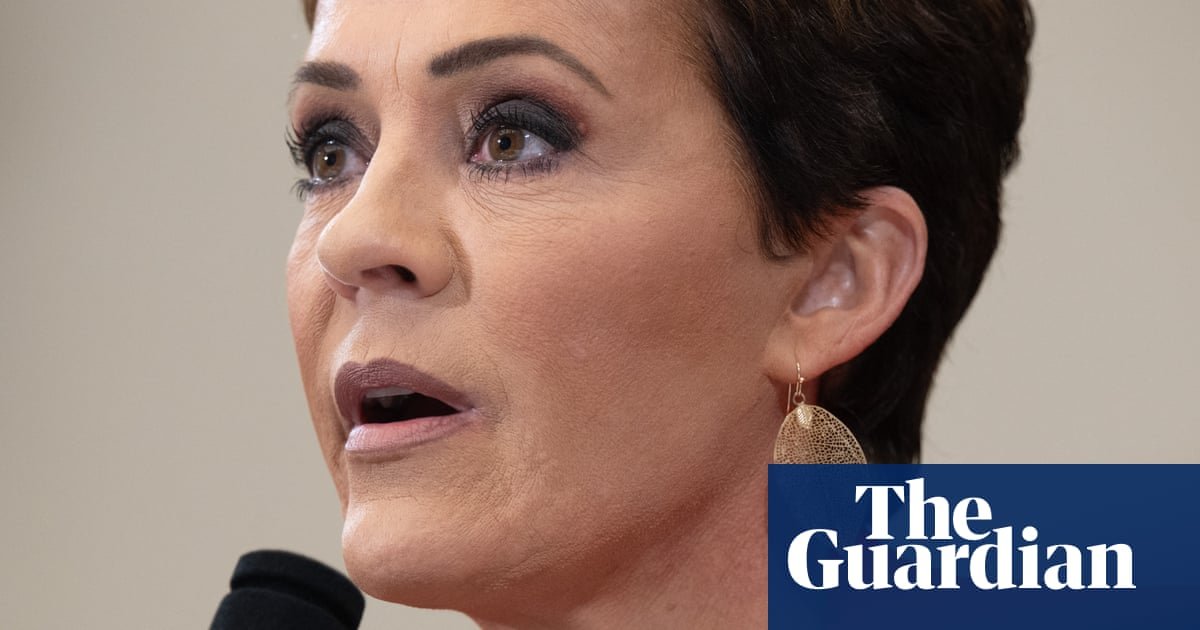
The agency that oversees Voice of America and other government-funded international broadcasters is eliminating jobs for more than 500 employees, a Trump administration official said. The move could ratchet up a months-long legal challenge over the news outlets’ fate.
Kari Lake, acting CEO of the US Agency for Global Media, announced the latest round of job cuts late Friday, one day after a federal judge blocked her from removing Michael Abramowitz as VOA director.
US district judge Royce Lamberth had ruled separately that the Republican administration had failed to show how it was complying with his orders to restore VOA’s operations. His order Monday gave the administration “one final opportunity, short of a contempt trial” to demonstrate its compliance. He ordered Lake to sit for a deposition by lawyers for agency employees by 15 September.
On Thursday, Lamberth said Abramowitz could not be removed without the approval of the majority of the International Broadcasting Advisory Board. Firing Abramowitz would be “plainly contrary to law”, according to Lamberth, who was nominated to the bench by Ronald Reagan.
Lake posted a statement on social media that said her agency had initiated a reduction in force, or RIF, eliminating 532 jobs for full-time government employees. She said the agency “will continue to fulfill its statutory mission after this RIF– and will likely improve its ability to function”.
“I look forward to taking additional steps in the coming months to improve the functioning of a very broken agency and make sure America’s voice is heard abroad where it matters most,” she wrote.
A group of agency employees who sued to block VOA’s elimination said Lake’s move would give their colleagues 30 days until their pay and benefits end.
“We find Lake’s continued attacks on our agency abhorrent,” they said in a statement. “We are looking forward to her deposition to hear whether her plan to dismantle VOA was done with the rigorous review process that Congress requires. So far we have not seen any evidence of that.”
They added: “We will continue to fight for what we believe to be our rights under the law.”
In June, layoff notices were sent to more than 600 agency employees. Abramowitz was placed on administrative leave along with almost the entire VOA staff. He was told he would be fired effective 31 August.
The administration said in a court filing Thursday that it planned to send RIF notices to 486 employees of VOA and 46 other agency employees but intended to retain 158 agency employees and 108 VOA employees. The filing said the global media agency had 137 “active employees” and 62 other employees on administrative leave while VOA had 86 active employees and 512 others on administrative leave.
The agency also houses Radio Free Europe/Radio Liberty, Radio Free Asia, Middle East Broadcasting Networks and Radio Martí, which beams Spanish-language news into Cuba. The networks, which together reach an estimated 427 million people, date to the cold war and are part of a network of government-funded organizations trying to extend US influence and combat authoritarianism.
In March, Abramowitz warned that Trump’s attempts to dismantle the VOA would be a “self-inflicted blow” to American national security, saying: “If America pulls off the playing field and cedes it to our adversaries, then they’re going to be telling the narratives that people around the world are going to be hearing, and that can’t be good for America … They’re going to be hearing an anti-America narrative. We need to fight that with truth.”
after newsletter promotion
He added: “The major challenge for the United States in general is this global information war in which countries like China and Russia are essentially really having our lunch. … So, I really feel that we need an organization that is accurate, unbiased, objective, and that tells the truth about America to the rest of the world in the languages that they understand.”
This week, Trump also moved to remove union protections from a handful of federal employees, including those from the VOA.
In response, the American Federation of State, County and Municipal Employees, the nation’s largest trade union of public employees, said: “AFSCME members who fulfill the Congressionally mandated mission to broadcast Voice of America around the globe shine the beacon of freedom on the most oppressive of regimes. Now, because they have been fighting to keep Voice of America’s mission alive, their own voice on the job has been stripped from them. AFSCME will fight this illegal action in court.”
Earlier this year, foreign staff at US-backed media outlets voiced concerns over their safety following Trump’s shuttering of the global media agencies.
Speaking to the Guardian in March, Jaewoo Park, a journalist for Radio Free Asia, said: “We have many co-workers in different services, several of whom came here and sought asylum visas. If their own government knew they worked for RFA [Radio Free Asia] and they went back to their own country, their lives would be at risk.”
“Authoritarian governments have praised what Trump is doing right now … In Burma, Vietnam, Laos, Cambodia, there were people who fought for freedom and democracy, and they came to work at RFA. It’s very risky for them. Their lives are in danger if Radio Free Asia doesn’t exist,” he added.
Business
Vineyards assess damage as wildfire rips through California wine country: ‘A devastating situation’ | California wildfires

Elton Slone and his colleagues at the Robert Craig Winery in Napa Valley had gathered for their annual pre-harvest company party last week – complete with copper pot carnitas and grape tacos – when one of his co-workers noticed an alert on her phone. The Pickett fire, a blaze that had started about 10 miles away near the town of Calistoga, was moving toward their vineyards on Howell Mountain.
Knowing that the Glass fire – a 2020 blaze that damaged numerous wineries and spoiled a year’s harvest – had burned along the same path, Slone hoped no fuel remained for this new fire. “But that was not the case,” he said. Within the week, the winery’s Candlestick Vineyard would become “a sacrificial lamb for the town of Angwin” when firefighters lit a controlled burn on their property to control the larger fire.
Vineyards can make excellent fire breaks because they are typically clear of burnable plant matter, and grape vines themselves are moist enough to be nonflammable. But heat damage and smoke can still destroy a crop.
The Robert Craig Winery lost the entire crop of their Candlestick Vineyard, which would have generated $4.5m in revenue. And Slone estimates about 10% of the vines will need to be replanted – a process that will cost hundreds of thousands of dollars and take a decade to see new bottles of wine ready for market. The team will test grapes on another one of their vineyards closer to harvest to see whether the smoke affected them.
The loss comes at the end of the growing season – after Slone’s vineyard had sunk nearly $1m into farming costs – and is made even more devastating because it’s happened before. The memories of the 2020 Glass fire and 2018 Camp fire, which burned farther east but still sent smoke to blanket Napa’s grapevines, are still fresh. “It’s financially a devastating situation,” said Slone.
The still-burning Pickett fire, which began on 21 August in northern Napa county, quickly burned through 6,800 acres (2,750 hectares), making it the San Francisco Bay Area’s largest wildfire this year. Preliminary estimates show that it caused $65m in agricultural losses, largely to wine grape growers, affecting about 1,500 acres (610 hectares) of agricultural land.
Although that damage is significantly less than that wrought by the Glass fire – which burned through 67,000 acres (27,000 hectares) and racked up $3.7bn in losses – the growing threat of wildfires in arid California has still shaken the wine industry.
“Northern California wine country is one of the treasures of the United States,” said Slone. “It’s something that I think all Americans should be concerned about because it’s a uniquely American thing.”
‘Tastes like a campfire’
Along the west coast, wine grape growers have implemented many strategies to prepare for wildfires – with the support of scientists at the US Department of Agriculture and local universities.
Ben Montpetit, chair of the University of California, Davis’s viticulture and enology department, said in an emailed statement that the industry has employed “barrier sprays to reduce smoke uptake, annual testing to establish baseline smoke marker levels in grapes, and small-lot fermentations after smoke events to assess potential wine impact”.
“Researchers are also investigating which grape cultivars are more sensitive or tolerant to smoke exposure,” he added.
“We’ve made a lot of progress in the preparedness realm,” said Natalie Collins, president of the California Association of Winegrape Growers, who noted the industry established a smoke exposure taskforce after the losses in 2018 to aid growers after wildfires.
The existence of that taskforce hints at a perennial problem for vineyards: though they can often keep wildfire off their acres, there’s little that can keep smoke at bay. And if smoke sits in an area for too long, it can leave grapes tasting ashy, like a campfire.
“Smoke taint issues are kind of fickle,” said Heather Griffin, a partner at Summit Lake Vineyards and Winery. “It depends on the varietal, depends on your ripeness level and depends on how long the exposure was.”
Griffin’s family’s vineyards were saved from the Pickett fire – “They stopped the fire at the end of our ridge up on Howell Mountain,” she said – but they’ll need to send grapes out for testing before harvest to be sure the smoke didn’t taint it.
Protecting the industry
For the first year ever, crop insurers are offering a new coverage option called the fire insurance protection smoke index endorsement, which would insure vineyards for losses due to smoke exposure.
But some growers say the cost of crop insurance has become unattainable after repeated wildfires.
“Our insurance went up so much after the fires of 2020. It literally went from $40,000 a year for really great coverage for all of our properties and inventory, and now it’s $300,000 a year and covers nothing,” said Slone.
For the 95% of Napa valley’s wineries that are family-owned, that cost can be “catastrophic”, he adds.
The wine industry has historically relied on federal funding to support USDA and university research into wildfire preparedness. Although those levels have remained steady despite widespread federal cuts, eight federal wine grape research scientists – including a smoke exposure specialist – were fired and then rehired early in the Trump administration’s Doge-era cuts.
“We want to make sure that an industry like ours continues to be protected,” said Collins, as “we continue to see the writing on the wall in California that wildfires likely will continue to be an issue here.”
It’s possible that some federal disaster relief funding may work its way to affected vineyards, but Griffin says buying wine from those wineries “helps everybody that’s up here”.
“Shoot them an email and buy some of their wine,” added Slone. “They will be the most appreciative people on the planet earth.”
-
Tools & Platforms3 weeks ago
Building Trust in Military AI Starts with Opening the Black Box – War on the Rocks
-

 Ethics & Policy1 month ago
Ethics & Policy1 month agoSDAIA Supports Saudi Arabia’s Leadership in Shaping Global AI Ethics, Policy, and Research – وكالة الأنباء السعودية
-

 Events & Conferences3 months ago
Events & Conferences3 months agoJourney to 1000 models: Scaling Instagram’s recommendation system
-

 Jobs & Careers2 months ago
Jobs & Careers2 months agoMumbai-based Perplexity Alternative Has 60k+ Users Without Funding
-

 Business1 day ago
Business1 day agoThe Guardian view on Trump and the Fed: independence is no substitute for accountability | Editorial
-

 Funding & Business2 months ago
Funding & Business2 months agoKayak and Expedia race to build AI travel agents that turn social posts into itineraries
-

 Education2 months ago
Education2 months agoVEX Robotics launches AI-powered classroom robotics system
-

 Podcasts & Talks2 months ago
Podcasts & Talks2 months agoHappy 4th of July! 🎆 Made with Veo 3 in Gemini
-

 Podcasts & Talks2 months ago
Podcasts & Talks2 months agoOpenAI 🤝 @teamganassi
-

 Jobs & Careers2 months ago
Jobs & Careers2 months agoAstrophel Aerospace Raises ₹6.84 Crore to Build Reusable Launch Vehicle


